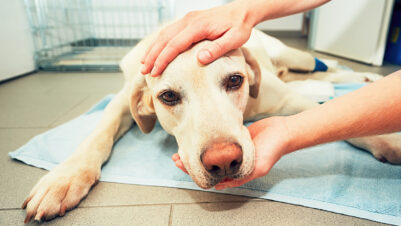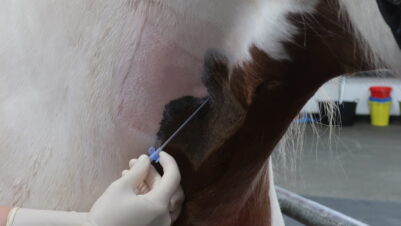Have you saved a life today? If not, how many have you saved during the past week, month or year?
From experience, I know there is no better feeling than successfully recovering an animal. I also know that these experiences can be among the most stressful in practice. I’ve given cardiopulmonary resuscitation (CPR) several times in the course of my career. Some attempts were more successful than others, but one instance in particular sticks in my mind.
I was recently qualified and in the middle of my list of afternoon consults when a distressed woman burst through the door of the practice carrying what appeared to be two Dachshunds firmly attached to each other. On closer examination it became apparent that one of the dogs had got its mandible trapped under its playmate’s half-check luxury leather collar and, in the ensuing panic, the playmate had effectively been strangled. He was no longer breathing and no pulse was palpable.
Having extricated both dogs from their owner’s arms, we rushed them through to the back of the practice. With a nurse, I began CPR on the collapsed dog, while shouting for someone to “find something to cut the collar”. This may have seemed an impossible task – but not for our quick-witted receptionist. She ran out into the street and demanded of some workmen on a construction site nearby that they follow her into the practice with their best bolt cutters.
In a scene not dissimilar to a Diet Coke advert, before I knew it an operative in a hard hat appeared and with one deft movement severed the collar, mercifully leaving both dogs intact. Still reeling from the prospect of near decapitation of two Dachshunds and/or amputation of our digits, we intubated the poor strangled pup and proceeded with CPR.
Thankfully, the outcome of this saga was two live dogs – and a very happy and grateful owner. While it had a happy ending, this situation sums up, for me, the potential chaos, stress and distress that can ensue when CPR is attempted. It also highlights that clear thinking and teamwork saves lives.
Global initiative
With these types of experiences in mind, and with more practices using out-of-hours services and perhaps performing CPR less frequently, during 2022 Improve International is launching a global initiative in collaboration with the Reassessment Campaign on Veterinary Resuscitation (RECOVER).
It is called “Save a Life Today” (SALT) and is aimed at highlighting the importance of appropriate, regular, evidence-based training to improve patient survival rates.
As a first step, we will be running a series of RECOVER courses, starting in the UK in early 2022, then moving to the Nordic regions and eventually spreading globally to all countries in which Improve International delivers its veterinary CPD training.
To support this initiative, our RECOVER course delegates will also be given access to Improve International’s innovative online learning platform, both before and after the course. This will give them access to additional resources, to reflect on their learning and share ideas with peers via its discussion forum.
Through our partnership with RECOVER, we hope to increase the competence and confidence of veterinary staff globally in conducting CPR and to build teamwork skills which will radiate into other areas of day-to-day operations. We hope that all veterinary professionals will be inspired to support this initiative and update their CPR skills. Over time, we hope that this will result in a positive impact on pet survival rates in the UK and, in due course, around the world.
What is the RECOVER course?

The RECOVER initiative was launched by a team of veterinary emergency and critical care specialists with the goal of developing and disseminating the first true evidence-based veterinary CPR guidelines.
When asked to comment on the campaign, the co-chairs of RECOVER said: “Throughout the pandemic, the RECOVER initiative has continued to push forward in our mission to update and expand the veterinary CPR guidelines and further research in veterinary CPR. We donated online CPR training to thousands of veterinary students who were unable to attend in-person classes during school closures. While the in-person training was impacted by the pandemic, we and all the certified RECOVER instructors can’t wait to offer these courses again as soon as possible.”
Improve RECOVER courses are led by certified instructors and are interprofessional, meaning that vets and nurses are encouraged to attend together so they go back to practice as a team to disseminate their knowledge across the practice team. Vets and nurses are also welcome to attend as individuals.
An online training module with RECOVER is completed prior to attending the two-day face-to-face course. Places are limited to ensure sufficient one-to-one attention. Successful delegates will become basic and advanced life support RECOVER Rescuer certified, and accrue a total of 20.5 hours of CPD.
The first attendance day covers the practical aspects of the certification. Day two will include:
- Effective leadership during and after CPR
- Creating the perfect crash cart
- Introducing simulation training within your team
- Critical care of patients that survive CPR, focusing on techniques for use in general practice
Meet Improve International’s certified RECOVER Instructors

Emily Thomas, BA, VetMB, FHEA, DACVECC, DECVECC, MRCVS, a specialist in emergency and critical care at Dick White Referrals, will lead Improve International’s RECOVER training.
She said: “Resuscitating a patient from cardiac arrest is one of the most rewarding things you can do as a veterinary professional.
“I vividly remember the first patient that I helped resuscitate successfully, which was a Miniature Schnauzer in anaphylactic shock after a bumblebee sting that went on to do well. The most difficult part was managing him after his recovery, and I learned a lot from this.
“I have also had my fair share of unsuccessful attempts, but despite the sadness I still find it rewarding knowing that I did everything I could for that patient and for their owner.
“CPR training for vets and nurses has traditionally focused on individual tasks such as chest compressions. However, we’re now realising that human factors such as organisation, teamwork and leadership are equally integral to success.
“This is an area of particular interest for me, and I’m hoping to bring some simple, evidence-based ideas to this course to help people improve these non-clinical aspects in their own practices.”
She added: “I’m incredibly excited to help build this course with RECOVER and Improve International. The RECOVER Rescuer certification course has an excellent international reputation, but until now it’s been difficult for vets and nurses in the UK to access the practical component of the course. It’s great that we can make this more readily available.
“However, I’m also excited that our course will go beyond individual certification and will aim to teach delegates how to use their new-found knowledge back in practice to review CPR protocols and help the rest of their team achieve better clinical outcomes.
“I often get telephone calls from practices asking how to manage patients after resuscitation that are too unstable for transfer or where owners elect not to refer. Therefore, we will also address this aspect of resuscitation, aiming to tailor discussion to the equipment and skill set available at delegate practices.
“I’m delighted to help teach something that I feel so passionate about, and to collaborate on this unique course designed for the whole veterinary team.”
Emily will be supported by Kathryn Latimer, DipAVN, DipHE, CVN, CertEd, CertVN(ECC), RVN. Kathryn is head of nursing services, leading the team of nurses and patient care assistants at Northwest Veterinary Specialists in Cheshire, providing clinical and managerial leadership as part of the day-to-day operation of the nursing team.
| We hope you will join our global SALT revolution! Sodium chloride is vital for life and this might just be the most essential CPD you undertake during your career – both for yourself and your patients. For further information, visit www.improveinternational.com For more information on the RECOVER Initiative, visit www.recoverinitiative.org |








